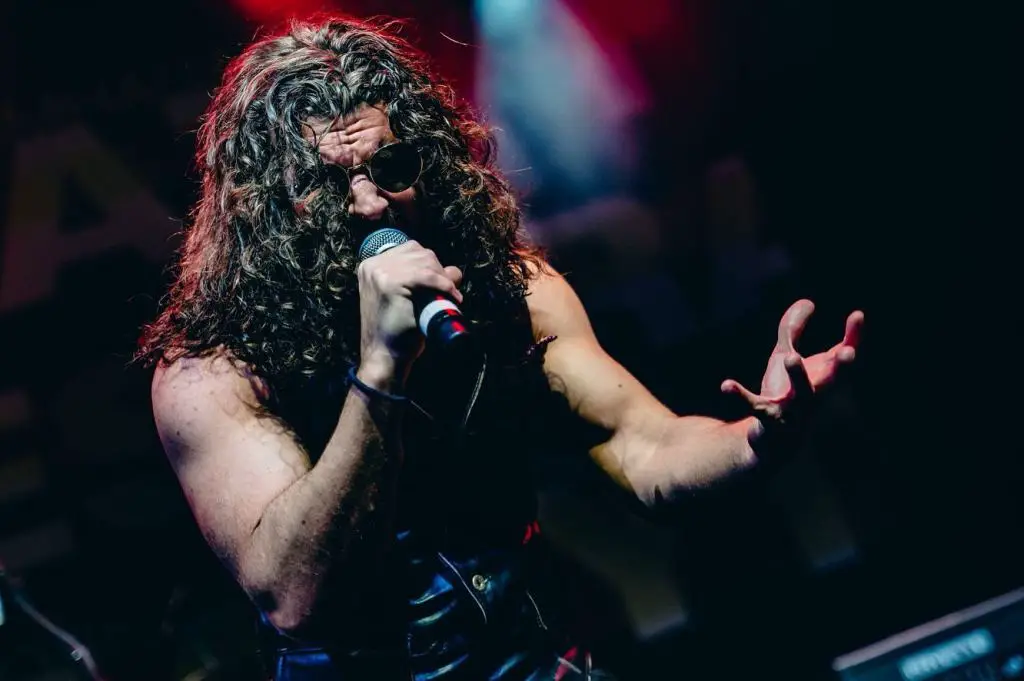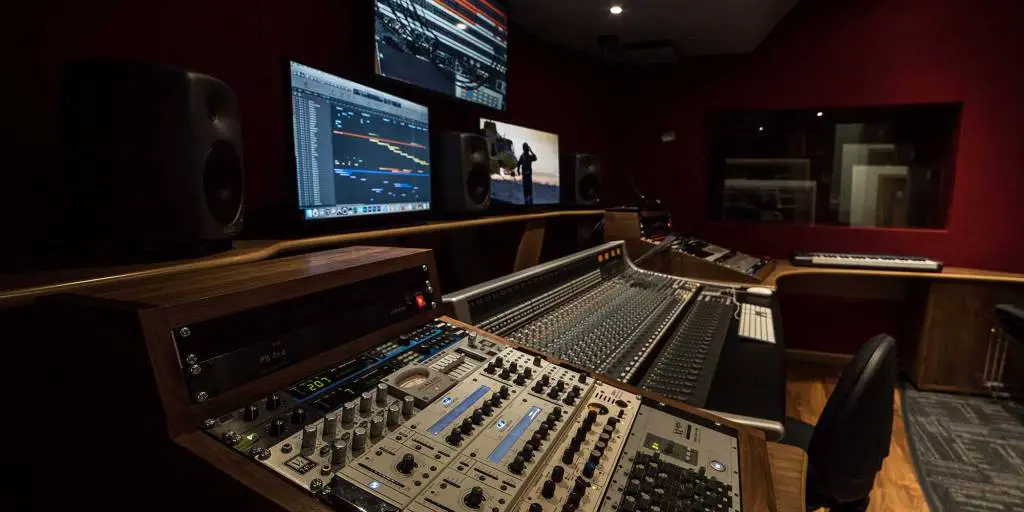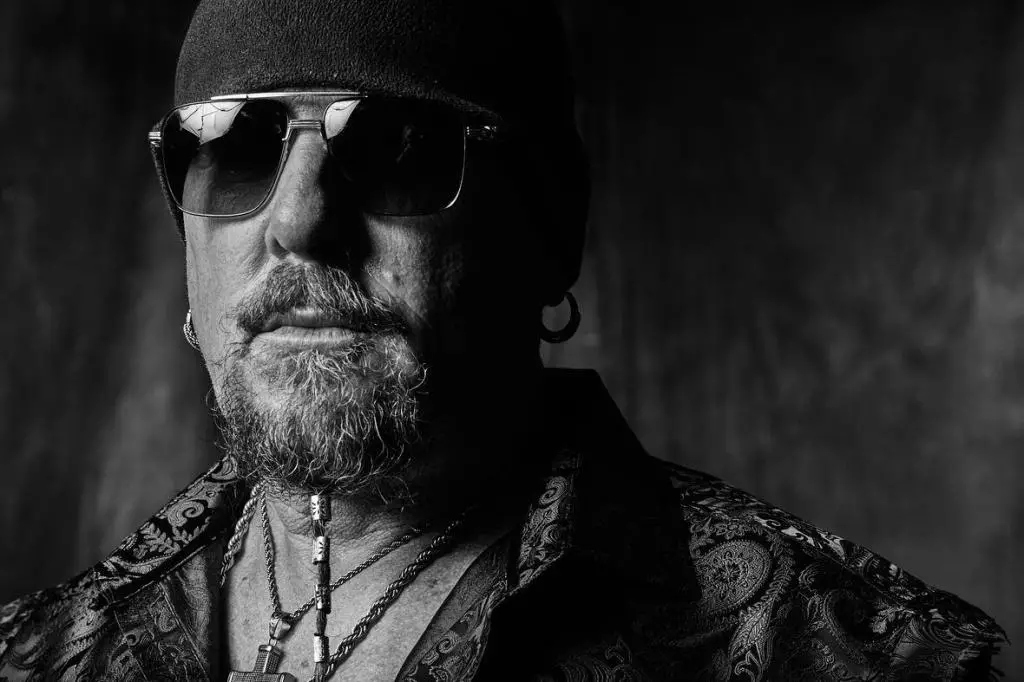Images courtesy of O’Donnell Media Group
When one has a family name as prevalent as “Hagar,” one would assume there are certain standards to uphold when your father has a highly prolific musical career in the annals of rock ‘n’ roll history as member of Montrose, solo career and of course not to mention Van Halen.
Andrew Hagar, in fact, does continue this legacy in his own way without needing to be a direct copy/paste of his father. Forging his own path forward in a world very different from his father’s that include new challenges and obstacles that didn’t exit in Sammy’s time such as navigating a sea of rampant social media and a world where anyone and everyone can get their music out there for the masses with the click of a button to even artificial intelligence in art and music.
As seen with Andrew Hagar’s latest release of “Systematic Minds,” he is unphased by the sudden and fast uprising of A.I. art, voice acting, music and writing, striving forward in his work of journalism and music without fear or hesitation of the future and what it may bring.
Let’s dive right into your new EP, Limited Edition Psycho.
We released a bunch of tracks in June that people may have heard already and a couple of they haven’t. “Systematic Minds” is the first song that I wrote with my producer and co-writer Trev Lukather, son of Toto guitarist Steve Lukather.
We’re very stoked to release all this music we started writing back in December 2020. That’s one of the toughest parts of being an artist, waiting to release stuff and you’re already writing or recording new stuff so you’re going to be a bit removed from it by then but it’s new to the listener and that’s what matters.
Would you say, as an artist, that your work is never done, even after something is released you want to go back and change something?
Absolutely. That’s the beauty of playing live, you can make those changes, tweak things here and there that you may hear after a song is released and that’s part of being an artist! The vocal melody might change a little bit or the inflection on certain parts. You might even change little words here and there.
What can you tell us about the single “Systematic Minds” seeing as you mentioned it was written during the pandemic?
When you write a song, you never know what it’s going to mean to people. Obviously, you’re in a certain headspace when you write it, and you’re writing it about a certain thing.
I wrote it during the early parts of the pandemic, just about all of the weird, systematic ideology that people were finding themselves locked into, that was a really divisive time and obviously, things have maybe gotten worse to a certain degree since then. Going back and looking at the song, it’s evolved and so has its meaning.
Seeing how things have sort of devolved with the comeuppance of A.I. like ChatGPT where our thoughts, words, art and whatnot aren’t even our own and are being reduced to having AI work and think for us.
Can you go into detail about the songs, especially in this day and age of streaming in an endless ocean of artists?
I released it around my birthday to get the bump of attention from my birthday to coincide with the release to get those pre-saves. In this economy, it’s difficult to get the much-needed attention so you have to get above and beyond the algorithm and use it to your advantage.
How do you feel having the Hagar name has affected your musical career and getting your work seen?
I think it makes it even more challenging because you have this weird push and pull with people where they have these certain expectations having the Hagar name. It’s like people who really love and appreciate my dad and his iteration of Van Halen want to hear that from me and when I don’t deliver it, they’re disappointed. It’s something I’ve been dealing with my whole life where people have preconceived expectations of me, so, it’s a blessing and a curse.
You’re not new to the music scene. Can you talk about your evolution from your early days in punk to what you do now?
I grew up in central California and I would go up north a lot and go to hardcore shows with my friends. We would see bands like early AFI. Growing up at the height of the skate punk era, I was obsessed with bands like Dead Kennedys, NOFX and Rancid so that really informed a lot of my personality.
I played a little bit of music growing up, I played drums for my school, and I’d sing in choir and stuff, but I didn’t really pick up a guitar with any meaning or purpose until the mid 2000s and my buddy John, who’s a really sick punk rock drummer, and I started jamming together at parties. Nothing too serious at the time but it was a great experience.
I then did a little project that my brother had in 2012, which I still get shit for all the time called Fight Club. We tried to put together a record and a lot of things happened with my brother’s management at the time, I came in and sang backing vocals and played some rhythm guitar, and that was about it.
In 2016, the person I was dating and I put together a little folk duet project and then ended up on the road with Kris Kristofferson, which was insane. Then by virtue of that with Willie Nelson and the rest is history!
Let’s move on to filming MTV’s Family Legacy. What was the filming process like, did they show you any of the footage of your father prior to shooting your segment?
They did not. I was offered the show after a buddy of mine that’s now got a great independent production company recommended me to Glass Entertainment. The producers for Family Legacy did their research and came here to my studio and we did about seven hours of interviews, one of which was with my dad.
We watched a few things from MTV, like the VMAs and stuff, but that was a very small portion of the interview. They did a really in-depth interview with me about everything. Talking about the good and bad and a lot about mental health, my music, my background, and it was a very comprehensive interview.
I had absolutely no idea what they were going to put on the show. It was also sold to me in a very different way than it was presented, which is very typical of television.
How different did it turn out than you expected it to be?
I’m really careful what I choose when I get offers for reality TV shows and such. This felt like it was going to be different. Originally it was supposed to be 10 episodes and everybody had their own episode so I was a bit disappointed to find out they crammed everything in 30 minutes between Draven [Bennington] and I.
Draven is such a sweet kid, I don’t know if he was happy with the way it came out, but it could’ve been a lot worse and a lot more inflammatory so I am happy it wasn’t like that.
As you said, they did about 7 hours of interviewing to ultimately use 15 minutes for your part…
Everybody who’s talked to me about the show enjoyed it and enjoyed our section. I liked that they conveyed a sense of humor between my dad and I because that’s like how it is normally. We kind of roast each other and give each other shit a lot so I think they did a good job of reflecting that.
There was one thing they did, they kind of made it sound like I was some sort of addict. I smoked a lot of pot when I was a teenager or whatever but I wouldn’t say that I was addicted to any substances. So they took that out of context. You know how TV is, gotta get the drama in.
Images courtesy of O’Donnell Media Group
One great part of your episode was where you were being put in the back of the “I Can’t Drive 55” Ferrari as a kid without a child seat…
You know, that’s probably not the first nor the last time that man was exceeding 150 miles per hour. I don’t drive any of his luxury cars [laughs].
You don’t get to drive his cars, but, how about any of his instruments and guitars?
I have, but I didn’t really use any of his old instruments on any of this record, because we recorded it mostly at Trev [Lukather]’s. I had a few different side projects, smaller stuff that I did before I started releasing music under my own name, and explored a variety of different genres.
I recorded most of that stuff here at the house at our music studio. We have a ton of instruments in here, so I got to dabble around with some stuff on my old S.O.S EP. There’s an electric sitar up here so I did a weird psychedelic jam which was really cool. But yeah,
I definitely enjoy being around all of this just incredible, old equipment. It’s like a vintage instrument lover’s wet dream being in here because of all this cool stuff.
You started writing this album in 2020 during the height of the pandemic, would you say this is a pandemic album or was it something you were sort of working on prior?
I had been working on a lot of different things throughout the pandemic, I had more of an indie rock/indie folk record that was almost done that I was talking to a couple of labels about. I had a South by Southwest slot booked and a release tour in Western Europe and release show in London, all these things that just got completely axed by the pandemic.
I didn’t know whether I should release the stuff on my own or not. I released a couple cuts of Cold Knife Karma and people seem to enjoy it, I got an editorial playlist spot on Spotify through that song. I didn’t know what to do after that, though, because it’s expensive to release music as an independent artist.
I really want to get back out on the road, I want to play festivals, I want to tour Europe, I want to do all this stuff and to do that stuff without being incredibly independently wealthy, which I am not contrary to what a lot of people might think. You should just be able to release art to the masses easily.
How did the release of “Systematic Minds” come about through all of this?
I was at an impasse and didn’t know what to do, and like everybody else, we were all kind of going through this collective trauma. My good friend Trevor Lukather hit me up and said he had heard a few of the songs off the record that were getting some attention and said he got a great idea for a song for me and sent it to me.
It was very similar to what I was doing with the psychedelic rock I was doing and other things that I liked. I drove down to L.A. in December, maybe a week before Christmas and we spent the next couple of days working on what would become “Systematic Minds”. I think it’s one of the most unique cuts off of the album.
But, to answer your previous question, I would say yes, it is a pandemic album. It was recorded during the pandemic and it’s all about the collective emotions we were all experiencing, but it definitely can stand on its own!
Dig this? Check out the full archives of A.M. Radio, by Anthony Montalbano, here: https://vinylwritermusic.wordpress.com/a-m-radio-archives/




Leave a Reply